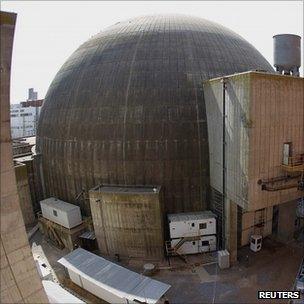UK nuclear programme gets go-ahead despite Fukushima disaster
- Published

Fukushima has inspired art events including a pedal-powered demonstration in Paris
The Fukushima disaster provides no reason to restrict UK nuclear reactors or stop building new ones, the official nuclear regulator has concluded.
Dr Mike Weightman, the UK's chief nuclear inspector, found no fundamental weaknesses in the current licensing regime or safety principles.
But "continuous improvement" should be sought, he said in his report.
The government commissioned the report, external after the March tsunami damaged Japan's Fukushima Daiichi plant.
Dr Weightman released a set of preliminary conclusions in May, including recommendations that plant operators should review issues such as ventilation, electrical backup systems, storage of spent fuel rods, and flood protection.
His final report expands on those recommendations, but finds no reason to curtail the new build programme that the government wants to fulfil energy and climate change targets.
"I remain confident that our UK nuclear facilities have no fundamental safety weaknesses," he said.
"But we are not complacent. No matter how high our standards, the quest for improvement must never stop.
"Action has already been taken in many cases, with work under way to further enhance safety at UK sites."
A priority, he said, was to press ahead with clean-up plans for "legacy" sites such as Sellafield.
'Rushed and complacent'
Earlier this year, Dr Weightman led a fact-finding mission to Japan under the auspices of the International Atomic Energy Agency (IAEA).
He said that his findings on this trip, and the conclusions contained in a separate Japanese government review, had fed into the new report.
But, the report warns: "The detailed circumstances of the accident in Japan are not yet fully known, and some may not be possible to determine given the loss of control and of certain instrumentation."
This point was picked up by critics of the nuclear industry including Greenpeace, whose campaigner Louise Hutchins described the report as "rushed".
"It's designed with one objective - to give the green light to a new generation of nuclear power stations, irrespective of the safety, environmental or rising financial costs of those nuclear stations," she said.
And Paul Dorfman from Warwick University, a member of the NuclearConsult academic grouping, described it as "complacent".

A number of countries including Argentina are forging ahead with nuclear programmes
"That the report says that our UK nuclear facilities have no fundamental safety weaknesses is a clear abrogation of regulatory responsibility," he said.
"An accident is by definition accidental; and when things go wrong, as we've learned in Fukushima and Chernobyl, the human and environmental impact can be very, very great."
Dr Dorfman pointed to the interim report's conclusion that flooding risks remained to be completely evaluated by regulators.
However, Dame Sue Ion, a long-time nuclear engineer and now Fellow of the Royal Academy of Engineering, said the report endorsed nuclear new build, with some enhanced safety features.
"Mike Weightman points out that the industry and others have responded constructively and responsibly to the recommendations made in the interim report and instigated, where necessary, significant programmes of work," she said.
"This shows an on-going commitment to the principle of continuous improvement and the maintenance of a strong safety culture."
Powering ahead
The government will press ahead with plans to establish the Office for Nuclear Regulation (ONR) as a self-standing entity.
Dr Weightman intends to produce a further report in a year's time, to evaluate how far the industry has moved on the recommendations he has made.
Chris Huhne, Secretary of State for Energy and Climate Change, thanked the chief inspector for his work.
"The report makes clear that the UK has one of the best nuclear safety regimes in the world, and that nuclear power can go on powering homes and businesses across the UK, as well as supporting jobs," he said.
"We must however continue to improve where we can, not just with operating power stations and new sites, but by dealing with our nuclear legacy in a robust and effective manner too."
Follow Richard on Twitter, external
- Published9 October 2011
- Published19 July 2011
- Published11 July 2011
- Published21 June 2011
- Published8 June 2011
- Published18 May 2011